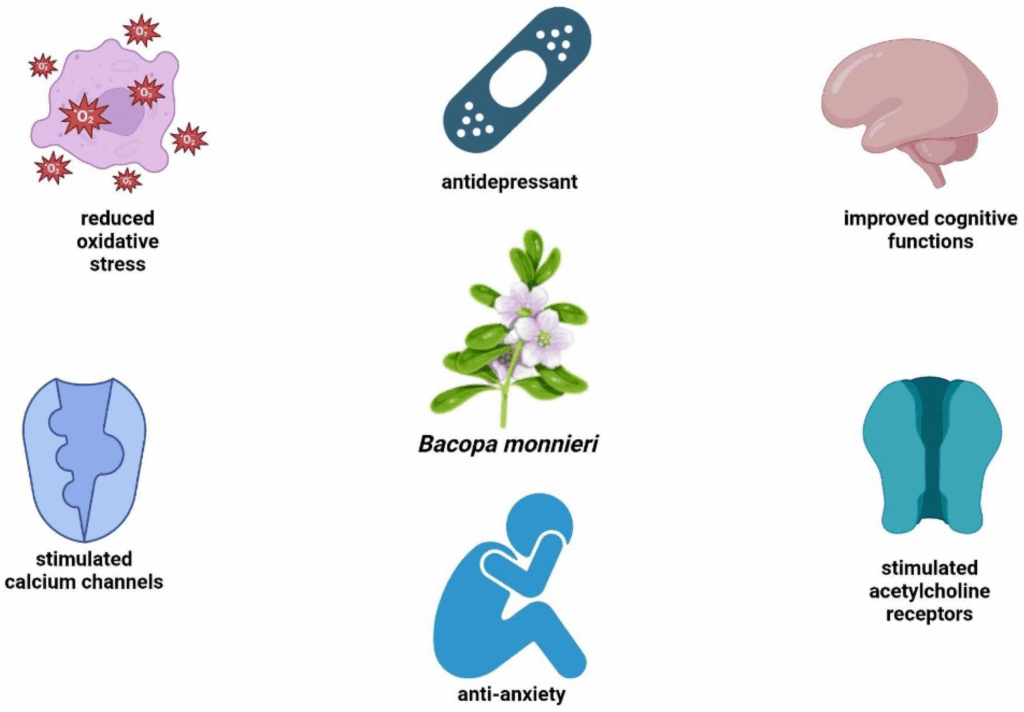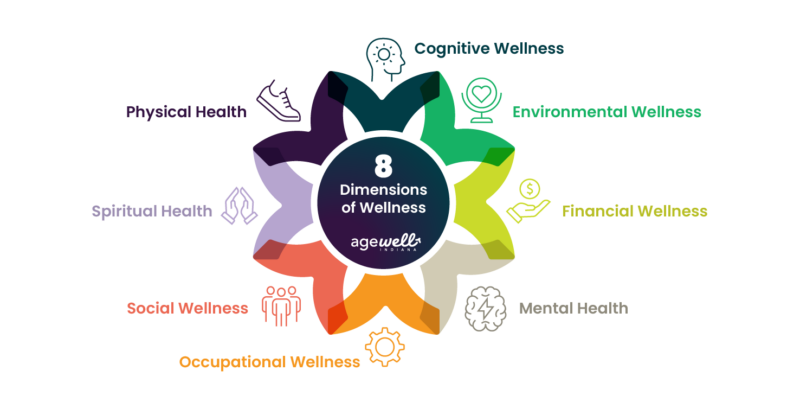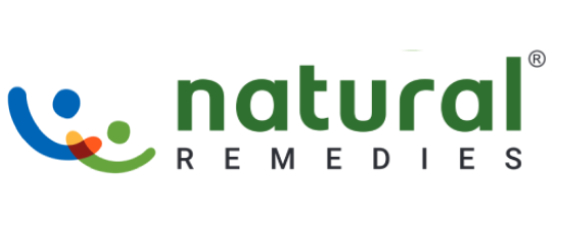
In the expanding field of cognitive health, herbal nootropics occupy a growing role as safe, multifaceted alternatives to synthetic nootropic drugs. Among these, botanicals like Ginkgo biloba, Panax ginseng, Ashwagandha, Rhodiola rosea, and Bacopa monnieri have gained substantial attention for their clinically documented benefits in memory, focus, stress resilience, and mental stamina. Each herb provides unique mechanistic support, some by promoting neuronal circulation, others by modulating neurotransmitters or by offering antioxidant protection.
Yet among them, Bacopa monnieri (Brahmi) emerges as the most comprehensively validated Ayurvedic cognitive enhancer, consistently demonstrating improvements in memory, learning, and long-term neuroprotection.
Why Bacopa is Scientifically Unique

Unlike fast-acting nootropic stimulants that temporarily boost alertness, Bacopa monnieri functions through neuroadaptation, enhancing neuronal efficiency and resilience over time. Its mechanisms of action are broad and biochemically nuanced:
- Memory and learning: Bacosides A and B, the primary triterpenoid saponins, enhance synaptic efficiency through modulation of acetylcholine, serotonin, and GABAergic systems.
- Neuronal protection: The same bacosides reduce β-amyloid aggregation, inhibit oxidative stress, and stabilize synaptic proteins essential for long-term memory formation.
- Neuroplasticity: Preclinical research shows increased dendritic branching and neuronal communication, underscoring Bacopa’s structural contribution to learning.
Clinical studies extend these findings. Human trials show significant improvements in delayed recall, working memory, attention scores, and cognitive tests measuring processing speed with standardized bacoside-rich extracts. Importantly, these benefits accrue gradually, with sustained effects observed after 8–12 weeks of supplementation, proof of Bacopa’s adaptogenic action rather than symptomatic stimulation.
The Problem with Generic Bacopa
Despite Bacopa’s scientific reputation, product quality across the market remains highly inconsistent. Most commercial extracts claim “50–60% bacosides by UV,” but this UV spectrophotometry method is nonspecific, as other saponins and plant metabolites absorb at similar wavelengths. This inflates reported percentages and obscures the true active composition. Such extracts often:
- Lack defined ratios of Bacoside A and B.
- Show variable potency between batches.
- Deliver inconsistent or negligible cognitive function benefits.
This misrepresentation erodes trust among consumers and clinicians alike. Without validated standardization, even a plant as powerful as Bacopa monnieri risks reputational harm and therapeutic inconsistency.
For an in-depth look at preventing adulteration, see Preventing Adulteration in Bacopa monnieri.
BACOMIND®: Scientific Leadership in Bacopa

BACOMIND® was developed to address precisely this gap between tradition and scientific rigor. It represents a clinically proven, full-spectrum extract of Bacopa monnieri, setting new standards for quality, bioactive accuracy, and reproducible efficacy.
- Advanced Standardization: BACOMIND® is standardized by HPLC (USP method) across nine key bioactive markers, including all major Bacoside A and B sub-fractions (Bacoside A3, Bacopaside II, and Bacopasaponin C). This precision provides a verifiable bacoside fingerprint, ensuring that every batch matches the clinically validated composition.
- Clinically Validated Results: Natural Remedies’ BACOMIND® has been tested in both adult cognitive studies and pediatric ADHD trials, the only Bacopa extract with documented improvements in focus, memory, and learning outcomes across age groups.
- Safety and Traceability: Developed under farm-to-formula traceability, BACOMIND®’s raw material integrity, purity, and absence of adulteration are independently verified. Toxicology studies confirm its safety for long-term use.
By combining Ayurvedic authenticity with modern analytical precision, BACOMIND® redefines Bacopa as a pharmacologically dependable herbal nootropic.
The Trend Opportunity for B2B Innovators
The global cognitive wellness sector is evolving rapidly, driven by aging populations and increasing mental performance demands. For formulators and brand leaders, this growth creates distinct opportunities:
- New Market Segments: Bacopa’s clinical evidence supports applications beyond traditional memory aids, extending into children’s learning support, mental clarity for professionals, and healthy aging.
- Holistic Combinations: Combining Bacopa with complementary botanicals amplifies outcomes:
- Ashwagandha for stress resilience and hormonal balance.
- Ginkgo biloba for cerebral circulation and oxygenation.
- Probiotics and adaptogens for gut-brain axis and mood regulation.
- Clinical Differentiation: Using regulated, HPLC-standardized extracts such as BACOMIND® enables brand distinction through verified efficacy and scientific storytelling, essential for premium product positioning.
Ayurvedic Herbs Supporting Cognitive Longevity
Modern science increasingly validates time-honored Ayurvedic formulations that nourish the brain and strengthen neural adaptability:
- Ashwagandha (Withania somnifera): An adaptogen known for lowering cortisol, enhancing sleep quality, and supporting memory retention under stress.
- Shankhpushpi (Convolvulus pluricaulis): Traditionally used as a Medhya Rasayana for calming the mind and improving concentration.
- Gotu Kola (Centella asiatica): Enhances alertness; studies suggest neurovascular benefits in cognitive fatigue.
- Turmeric (Curcuma longa): Curcumin supports antioxidant defense and reduces neuroinflammatory stress, a protective aid in age-associated brain decline.
Each ingredient works along different yet convergent biological pathways, offering a multi-targeted approach to cognitive preservation.
Conclusion
As the intersection of science and Ayurveda strengthens, the future of nootropic drugs is increasingly natural, evidence-based, and safe. Bacopa monnieri, supported by innovations like BACOMIND®, exemplifies how traditional botanicals can redefine modern cognitive function enhancement, balancing efficacy with long-term brain health.
For B2B formulators and wellness brands, adopting validated herbal cognitive enhancers means delivering trusted, effective, and differentiated products that promote mental health and cognitive wellness without adverse medicine side effects.
FAQs
1. What are herbal nootropics, and how do they support cognitive wellness?
Herbal nootropics are plant-based compounds that naturally improve cognitive function, enhancing focus, memory, and mental health. They achieve this through neuroprotective, antioxidant, and adaptogenic mechanisms without the harsh medicine side effects of synthetic nootropic drugs.
2. Which traditional herbs are most commonly used as natural nootropics?
Common natural cognitive enhancers include Bacopa monnieri, Ashwagandha, Ginkgo biloba, and Gotu Kola, all of which have been studied for their effects on brain performance and stress resilience.
3. What scientific evidence supports the effectiveness of herbal nootropics?
Numerous clinical studies support standardized extracts like BACOMIND®, demonstrating measurable improvements in cognitive tests, attention, and learning ability in both adults and children.
4. How do herbal nootropics compare to synthetic cognitive enhancers?
Unlike synthetic nootropic drugs, herbal alternatives offer gradual, long-term improvements in brain health. They build resilience and neuroplasticity rather than just short-term stimulation.
5. Are there any side effects or precautions to consider when using herbal nootropics?
When sourced from verified extracts like BACOMIND®, herbal nootropics are generally safe. But, it’s advisable to consult an expert before starting supplementation, especially for individuals with existing mental health conditions or taking other medications.
